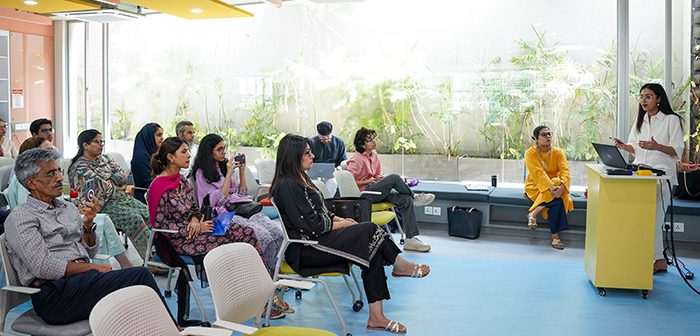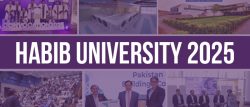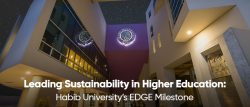At Habib University, education is grounded in critical thinking, hands-on learning, and a deep commitment to social change. This ethos came alive at the Final Year Project (FYP) Showcase 2025, where graduating students presented innovative, solution-driven work addressing pressing challenges across communities and disciplines.
Held on May 17, 2025, the event brought together students from the Dhanani School of Science and Engineering (DSSE) and the School of Arts, Humanities, and Social Sciences (AHSS), offering them a platform to turn academic learning into real-world impact.
Spotlight on the Final Year Project (FYP) 2025 Showcase
The showcase captured the depth and breadth of Habib University’s liberal arts and sciences education with projects ranging from reimagining digital accessibility to confronting climate change, advancing mental health support, addressing social inequality, and pushing the boundaries of emerging technologies. Each project reflected students’ drive to create thoughtful, tangible change in the world around them.
Understanding Local Challenges in a Global Context
Students approached their final year projects with a strong awareness of how challenges faced in local communities are often tied to broader global dynamics.
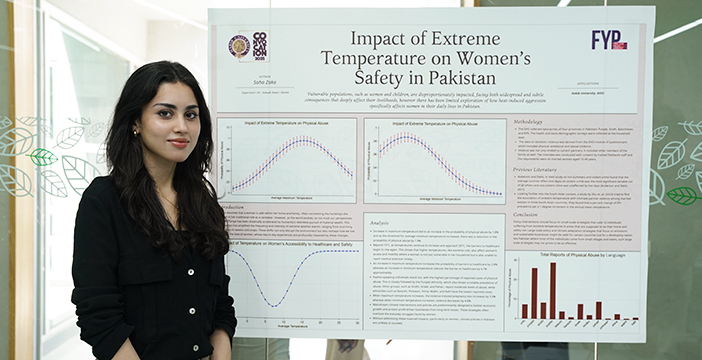
One Social Development and Policy (SDP) project, ‘The Gendered Impacts of Extreme Heat in Karachi’, revealed how climate change disproportionately affects women in low-income communities, exposing them to increased health risks and restricted mobility. The research highlighted how environmental degradation, especially in vulnerable areas like the Indus Delta, deepens existing inequalities.
Another SDP project, ‘Rebuilding the Self: A Phenomenological Study on Resilience in Young Adults Following Adolescent Bereavement,‘ explored the emotional terrain of young people who have lost a parent or sibling. It emphasized the role of community support in healing, contributing to broader conversations on mental health and resilience.
Leveraging Technology for Societal Impact
Many of the projects at the FYP showcase showed how technological innovations can contribute to sustainable development and social well-being.
In one such Electrical and Computer Engineering (ECE) project ‘IMC Autonomous Tow Truck (Localization and Path Planning)’ students retrofitted an electric tow truck with autonomous features to automate tasks in manufacturing, boosting productivity and reducing labor in risky settings.

Another EE project, ‘Optimizing EV/BESS Integration for Grid Support Services’ addressed Pakistan’s energy challenges by proposing smarter integration of renewable energy into the national grid, aiming for greater stability and sustainability.
Electrical Engineering students also introduced ‘PanelBot’, an automated Solar Panel Cleaning Robot designed to boost solar panel efficiency through precise, water-conserving cleaning.
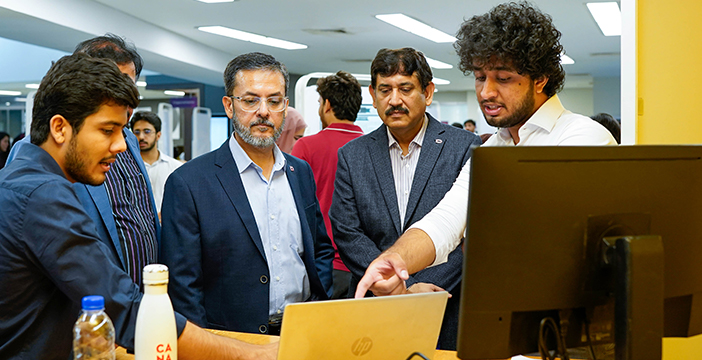
Other projects included ‘Multi-UAV System for Search and Rescue in Forest Environments,’ using drones for rescue in GPS-denied areas, and ‘Low Power Switching Fabric for High Radix Systems’, a smart, energy-efficient design that adjusts speed based on workload.
Design for Social Change
Thoughtful design and technology also emerged as tools for equity and inclusion.
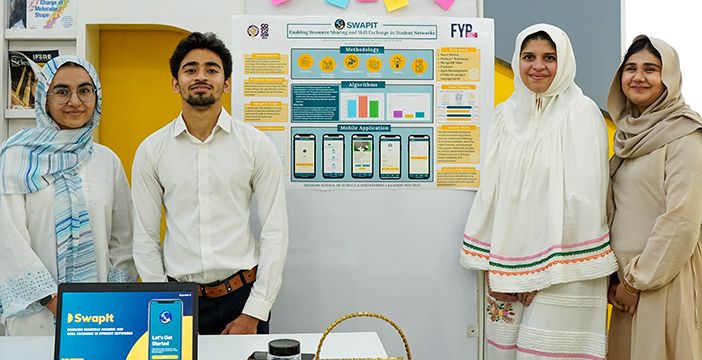
The Computer Science (CS) project ‘ALIF’ is a transformer-based language model for Urdu, using custom tools and large datasets to enhance AI accessibility and cultural relevance for nearly 230 million Urdu speakers worldwide.
Another CS project ‘Chavez: Screening and Progress Tracking Tool for ASD’ developed an Urdu-friendly digital tool to support caregivers of children with Autism Spectrum Disorder. In a country where early diagnostic resources are scarce, this tool has the potential to bridge a critical gap in support and care.
Other projects such as ‘SwapIt’, a skill and resource exchange app, and ‘Musafir’, a personalized travel planner for Pakistan, offered practical, community-focused solutions.
Visualizing Empathy and Change
The Communication and Design (CND) students used the power of visual storytelling, interactive media, and design thinking as tools for social awareness.
The project ‘Kaak’ by a Communication and Design student bridged Sindh’s artisan heritage with modern audiences through immersive design, offering a digital platform and space that honors and sustains traditional craft.

The short film ‘Saraab’ explored how infrastructural development often displaces marginalized communities in Karachi. It highlighted the physical risks and emotional sacrifices of the displaced, questioning the true cost of progress.
Another project titled ‘Nura’, aims to develop an app to support dementia caregivers by offering stress relief, organization tools, and educational resources to ease their burden and improve well-being.
Other projects like ‘Wise’, a personalized wellness app, and ‘Hey! That’s Not Yours’, a visual novel about self-discovery and friendship, showcased the power of interactive media to foster empathy and reflection.
Thinking Across Traditions
Our Comparative Humanities (CH) students engaged with philosophical, linguistic, and ethical dimensions to offer fresh perspectives on real-world issues.
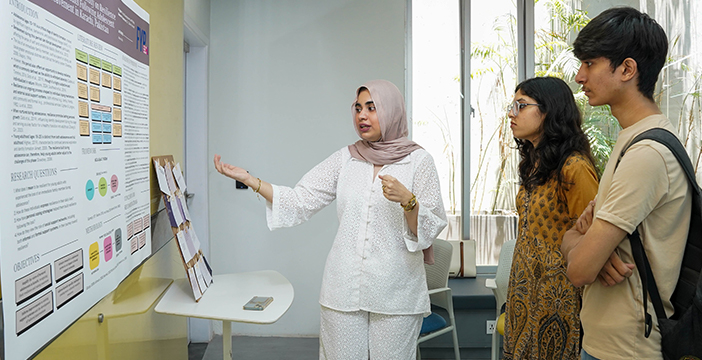
In ‘Rethinking Being: Comparative Ontologies of Sadra & Heidegger’, a student brought together Islamic and Western Thought, two distinct philosophical traditions, to explore how we understand existence, tradition, and modernity.
Another project ‘Hum ke Thehre Ajnabi: An Amnesiac Guide through the Severance from East Pakistan in 1971’ was a digital presentation investigating inherited trauma and silenced histories through an autoethnographic lens, showing how personal narratives connect to broader collective memories.
Other projects included ‘The Grammar of Governance’ which examined how school language policies shape inclusion or exclusion, and ‘Rumi and The West’ which explored moral and spiritual growth through the ethical ideas of Rumi and Plato.
Innovation with Purpose
The FYP showcase at Habib University reflected a shared drive for real-world impact. Whether it’s through data, code, film, or philosophy, our graduates are not just imagining a better world, they are actively building it.
As these projects move beyond the classroom, they carry with them the potential to influence policy, shape industries, and touch lives. They stand as proof that when students receive the right tools, mentorship, and freedom to explore, they respond with intellect, empathy, and courage.
Learn more about the FYP showcase 2025 here.

